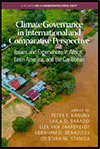
Climate Governance in International and Comparative Perspective
Issues and Experiences in Africa, Latin America, and the Caribbean
Edited by:
Peter F. Haruna, Texas A&M International University
Laila El Baradei, The American University in Cairo
Liza van Jaarsveldt, University of South Africa
Abraham D. Benavides, The University of Texas at Dallas
Cristina M. Stanica, Northeastern University
A volume in the series: Public Administration & Social Equity. Editor(s): Richard Greggory Johnson, University of San Francisco.
In Press 2024
This book pulls literature together to examine the quality of climate governance based in the experience of Global South regions—Africa, Latin America, and Caribbean. While these regions are resilient, the IPCC 2022 Report indicates that the effects of climate change are crippling their thinly structured governance systems and limited capacities. For example, in addition to environmental devastation, loss of life, and livelihoods, these regions have endured most of the “loss and damage” due to climate change impacts. How are they responding? What are the outcomes? And where do they go from here?
Given this background, the book’s goal is to question assumptions about climate governance patterns, systems, institutions, and processes in these regions, using comparative analytical techniques while distilling information about policy outcomes that other approaches do not provide. It argues that these regions and individual countries within them have a lot to learn from and about each other rather than look to the Global North and wealthy countries for economic, political, and administrative models that hardly match their lived experience and ontological outlooks. In doing so, it aspires to promote a fruitful South-South policy-related dialogue via scholarly exchanges and also contribute to advance the study and practice of international and comparative public administration. From this perspective, scholars, researchers, educators, public managers, and practitioners will find the book relevant to and useful for their respective endeavors.
CONTENTS
Preface, Peter F. Haruna and Laila El Baradei. Acknowledgments. PART I: INTRODUCTION. Climate Governance in Africa, Latin America, and the Caribbean, Peter F. Haruna and Cristina Stanica. Climate Governance in Global Context, Abraham David Benavides and Liza Ceciel van Jaarsveldt. PART II: REGIONAL PERSPECTIVES. Climate Governance in the East African Community, Henry Kimani Mburu and Joseph Ngunjiri Macheru. Trouble in Paradise: Climate Governance in the Cayman Islands, Genève Phillip-Durham. Forestry and Evolving Climate Governance of Costa Rica and Panama, 1969–2022, Michael S. Yoder. Climate Governance in the Central American Northern Triangle: Opportunities and Challenges of the Public Transport System, Hugo Renderos. PART III: NATIONAL PERSPECTIVES. Climate Governance in Development Perspective: A Comparative Study of Ghana and Nicaragua, Peter F. Haruna and Hugo Renderos. Public–Private–Community Partnerships as Pathways for Climate Governance in Zimbabwe, Brighton M. Shoniwa. Environmental Vulnerability and Disaster Prevention: A Study of Local Governments in Mexico, Manlio F. Castillo and Heidi J. Smith. Participatory Climate Change Governance in Enabling Leadership for Climate Action and Sustainable Development in South Africa, S. A. Mthuli. Ocean Health Part I: The Concept, Governance, and South African Context, Thean Potgieter. Ocean Health Part II: The South African Policy Experience and Lessons Learned in Sustaining Ocean Life, Thean Potgieter. Climate Change Governance and Institutional Structures in Egypt Pre- and PostCOP27, Laila El Baradei and Shaimaa Sabbah. Institutional Re-Structuring or Institutions Anew? A Decision Process in the Republic of Suriname’s National Climate Adaptation Planning, Kalim U. Shah. PART IV: LOCAL GOVERNMENT PERSPECTIVES. Climate Governance and Sea Level Rise: A Case Study of Alexandria City, Egypt, Laila El Baradei. Environmental Effects on Groundwater and Urban Drinking Water Quality by Landfills Leachate Infiltration: A Governance Approach, Miriam A. García-Colindres, Luis Antonio Castillo-Suárez, Carolina Alvarez Bastida, Verónica Martínez-Miranda, Ivonne Linares-Hernández, Abraham David Benavides, Monserrat Castañeda Juárez, and Vanessa González-Hinojosa. Climate Self-Governance: Decentralized Solar Systems in Kenya’s Cities, Victor Ferreros, Felix O. Vescovi, Susan E. Baer, and Angela M. Mai. Climate Governance: Stakeholders Adapting to Climate Change, N. S. Matsiliza. Climate Governance: An Anatomy of Community Understanding and Awareness of Climate Change, Redemption Chatanga and Maréve Biljohn. PART V: CLOSING. Assessing the Quality of Climate Governance: Lessons Learned and the Way Forward, Peter F. Haruna and Abraham David Benavides. About the Editors. About the Contributors.
-
Paperback979-8-88730-642-1
Web price: $62.04 (Reg. 72.99)
-
Hardcover979-8-88730-643-8
Web price: $89.24 (Reg. 104.99)
- eBook979-8-88730-644-5

- SCI092000 - SCIENCE: Global Warming & Climate Change
- NAT011000 - NATURE: Environmental Conservation & Protection
- POL044000 - POLITICAL SCIENCE: PUBLIC POLICY: Environmental Policy




